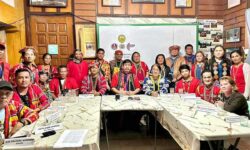
IP leaders call for NCIP reforms
APPROXIMATELY 60 Indigenous Peoples (IP) leaders from nine Indigenous Cultural Communities (ICCs) across Mindanao are uniting to advocate for camaraderie under the banner of “Tunay na Pagbabago.” They aim to highlight social issues within their communities and express concerns regarding reforms at the National Commission on Indigenous Peoples (NCIP).
On September 26, 2024, the IP delegation sought assistance from the Mindanao Indigenous Peoples Council of Elders and Leaders (MIPCEL) to arrange a dialogue with the 9th Commission of the NCIP or its department heads in this city.
The ICCs/IPs formally wrote to the NCIP to express their concerns, hoping for a chance to discuss their issues and potential solutions. Unfortunately, their request for dialogue went unacknowledged. Instead, they had the opportunity to share their concerns with MIPCEL EXECOM members.
The group previously sent copies of their consolidated letters to the Office of the President, the NCIP Central Office, and the Commission on Human Rights (CHR) Central Office via the CHR Region 11 office. MIPCEL officials, along with two former NCIP Chairpersons who now serve as Senior Advisers at MIPCEL/MIPCPD, participated in the discussions.
During a press briefing, representatives from the nine ICCs/IPs voiced their challenges and concerns. In a joint statement, they called for a complete reform of the NCIP, suggesting that all personnel should resign, with the option to reapply only if endorsed by the ICCs and IPs.
The group emphasized that the Indigenous Peoples’ Rights Act (IPRA) should remain unchanged, advocating instead for a review of its Implementing Rules and Regulations (IRR) to enhance or revise certain provisions as needed.
The panel also agreed that NCIP officials and personnel who violate the rights of ICCs/IPs and the implementation of IPRA should be held accountable in the appropriate courts or by investigative bodies. DEF



